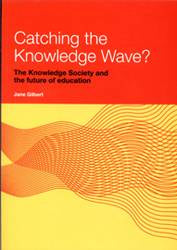Catching the Knowledge Wave : The Knowledge Society and the Future of Education
- Unit price
- / per
-
Author:Jane Gilbert
-
ISBN:9781877398049
-
Publication Date:January 2005
-
Edition:1
-
Pages:244
-
Binding:Paperback
-
Publisher:New Zealand Council for Educational Research
-
Country of Publication:New Zealand


A Back Order button means that we don’t have the book in stock at our store. It may already be on order – or we can order it for you from a publisher or distributor at no additional cost.
As we source items from around the globe, a back-order can take anywhere from 5 days to several weeks to arrive, depending on the title.
To check how long this might take, you’re welcome to contact us and we can provide an ETA or any other information you need. We recommend checking the timeframe before committing to an online order.
Catching the Knowledge Wave : The Knowledge Society and the Future of Education
- Unit price
- / per
-
Author:Jane Gilbert
-
ISBN:9781877398049
-
Publication Date:January 2005
-
Edition:1
-
Pages:244
-
Binding:Paperback
-
Publisher:New Zealand Council for Educational Research
-
Country of Publication:New Zealand
Description
Adding product to your cart
You may also like
A Back Order button means that we don’t have the book in stock at our store. It may already be on order – or we can order it for you from a publisher or distributor at no additional cost.
As we source items from around the globe, a back-order can take anywhere from 5 days to several weeks to arrive, depending on the title.
To check how long this might take, you’re welcome to contact us and we can provide an ETA or any other information you need. We recommend checking the timeframe before committing to an online order.
You may also like
You may also like
-
If this book were a film, it would be rated M – with a caution that "some viewers may be disturbed by some scenes." In Catching the Knowledge Wave? Jane Gilbert takes apart many long-held ideas about knowledge and education. She says that knowledge is now a verb, not a noun – something we do rather than something we have – and explores the ways our schools need to change to prepare people to participate in the knowledge-based societies of the future. The knowledge society is an idea that is widely discussed, but not well understood. Knowledge is developing a new meaning, one that is quite different to the one our schools were built on. Because of this, knowledge society developments are a major challenge for our schools. We cannot address this challenge by adding more ideas to our existing structures. We need a completely new framework – one that takes account of knowledge's new meaning, but also gives everyone an equal opportunity to succeed. If this seems like a tall order, it probably is – however this book attempts to map out such a framework. This is a book to argue with, to agree or disagree with, but above all to read – the future of our public education system is at stake.
-
-
Author: Jane GilbertISBN: 9781877398049Publication Date: January 2005Edition: 1Pages: 244Binding: PaperbackPublisher: New Zealand Council for Educational ResearchCountry of Publication: New Zealand
If this book were a film, it would be rated M – with a caution that "some viewers may be disturbed by some scenes." In Catching the Knowledge Wave? Jane Gilbert takes apart many long-held ideas about knowledge and education. She says that knowledge is now a verb, not a noun – something we do rather than something we have – and explores the ways our schools need to change to prepare people to participate in the knowledge-based societies of the future. The knowledge society is an idea that is widely discussed, but not well understood. Knowledge is developing a new meaning, one that is quite different to the one our schools were built on. Because of this, knowledge society developments are a major challenge for our schools. We cannot address this challenge by adding more ideas to our existing structures. We need a completely new framework – one that takes account of knowledge's new meaning, but also gives everyone an equal opportunity to succeed. If this seems like a tall order, it probably is – however this book attempts to map out such a framework. This is a book to argue with, to agree or disagree with, but above all to read – the future of our public education system is at stake.-
Author: Jane GilbertISBN: 9781877398049Publication Date: January 2005Edition: 1Pages: 244Binding: PaperbackPublisher: New Zealand Council for Educational ResearchCountry of Publication: New Zealand
-



